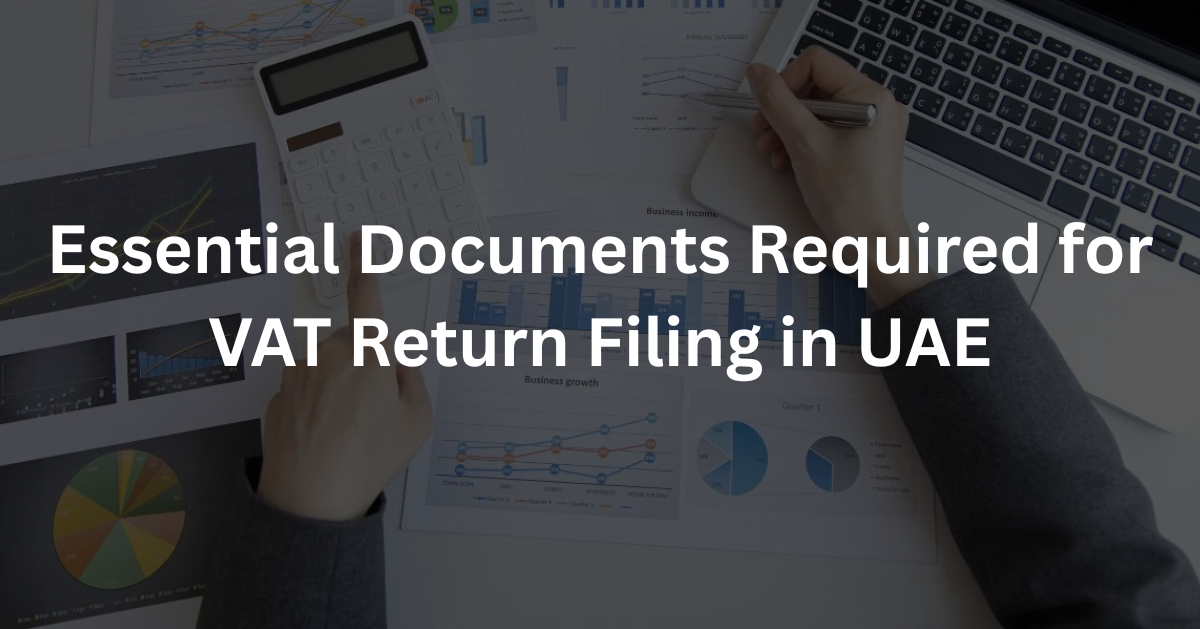Since the implementation of Value Added Tax (VAT) in the UAE in 2018, businesses have had to navigate a complex tax landscape. Filing VAT returns is a mandatory process, and getting it wrong can lead to penalties, fines, and additional scrutiny from the Federal Tax Authority (FTA).
In this guide, we will explore the essential documents needed for VAT return filing, the importance of keeping your records accurate, and how Alliance Accounting and Consultancy can assist you in managing your VAT obligations.
What Is VAT Return Filing?
VAT return filing involves submitting a form to the FTA that shows the VAT collected (output VAT) on sales and the VAT paid (input VAT) on purchases. For businesses registered for VAT, the return must be submitted either monthly or quarterly, depending on the size and structure of the company.
- Deadline: VAT returns are usually due on the 28th day of the month following the tax period.
- Filing process: Returns must be filed online through the FTA’s portal, which requires all relevant documentation for the reported period.
- Penalties for non-compliance: Failure to file returns on time or errors in filing can result in fines starting at AED 1,000 and scaling up depending on the nature of the error or delay.
Now, let’s dive into the key documents you’ll need to ensure a smooth VAT return filing process.
Essential Documents Required for VAT Return Filing in UAE
1. Sales Invoices
Sales invoices are essential for reporting the VAT you’ve charged customers. These invoices provide a clear record of the sales your business has made and the VAT collected (output VAT).
According to UAE VAT law, every sales invoice should contain the following:
- Date of issue
- Unique invoice number
- Customer details (name, address, and TRN if applicable)
- Description of goods or services provided
- Total amount charged (excluding VAT)
- VAT rate applied (typically 5%)
- Total amount including VAT
Why It’s Important: Sales invoices directly affect the output VAT on your return, which is the VAT you owe to the government. Missing or inaccurate invoices can lead to underreporting VAT, potentially triggering audits and penalties.
2. Purchase Invoices
Purchase invoices show the VAT you’ve paid on business expenses. This VAT is considered Input VAT, which can be deducted from your output VAT, reducing the total amount payable to the FTA.
A valid purchase invoice should include:
- Supplier details (name, address, and TRN)
- Invoice date
- Description of items purchased
- Total amount paid before VAT
- VAT charged
- Invoice total including VAT
Why It’s Important: Claiming input VAT allows businesses to recover the VAT paid on business expenses, effectively reducing their VAT liability. However, input VAT can only be claimed if accurate and complete purchase invoices are available.
3. Credit and Debit Notes
Credit and debit notes are essential for adjusting VAT amounts in cases where goods are returned, discounts are given, or price changes occur.
- Credit notes: Issued when a sale is canceled or goods are returned. It reduces the amount of output VAT.
- Debit notes: Issued when additional charges are applied to a sale. It increases the output VAT.
These notes should clearly refer to the original invoice, and include the revised VAT and invoice totals.
Why It’s Important: Failing to adjust VAT using credit and debit notes could result in overpayment or underpayment of VAT, leading to discrepancies in your VAT return.
4. Customs Documentation
For businesses that import or export goods, customs documentation is crucial. Imported goods are subject to VAT, which can be claimed as input VAT if proper documentation is provided.
Key customs documents include:
- Bill of entry: Proof that goods have been imported into the UAE.
- Import declaration: A document that outlines the details of imported goods, including the value and applicable VAT.
- Customs duty payment slips: These show any duties or VAT paid to customs authorities.
Why It’s Important: Without proper customs documents, businesses cannot claim the input VAT paid on imports, which can lead to increased VAT liabilities.
5. Expense Records
All business-related expenses should be documented, particularly if they include VAT that can be claimed as input VAT. Expenses such as travel, office supplies, and operational costs can all contain reclaimable VAT.
Required Information:
- Date and nature of the expense
- Supplier details
- VAT charged on the expense
- Total cost including VAT
Why It’s Important: These records not only help in claiming VAT refunds but also in ensuring that all deductible expenses are accounted for, which can reduce the overall VAT liability.
6. Financial Statements
A financial statement summarizing your revenue, expenses, and profit or loss for the VAT period is essential for reconciling VAT figures. This will help ensure that input and output VAT are reported accurately.
Why It’s Important: Discrepancies in your financial statements and VAT returns can raise red flags during an audit, leading to penalties or additional investigations by the FTA.
7. Bank Statements
Bank statements serve as supporting evidence for all VAT-related transactions, whether incoming or outgoing. These help verify the payments and receipts tied to VAT amounts, ensuring transparency.
Why It’s Important: Bank statements provide an additional layer of verification, helping to cross-check figures in the VAT return and avoid any reporting errors.
8. Zero-Rated and Exempt Sales Records
Not all sales in the UAE are subject to VAT. Some goods and services fall under the zero-rated (0% VAT) or VAT-exempt categories, such as exports, healthcare, and education.
For zero-rated and exempt sales, the following information is required:
- Date of sale
- Customer details
- Description of goods/services
- Value of the sale (excluding VAT)
Why It’s Important: While no VAT is collected on these sales, they still need to be reported correctly. Misreporting these sales could result in VAT being charged incorrectly, leading to penalties.
Why Accurate Documentation is Crucial for VAT Filing?
Accurate documentation is the backbone of VAT return filing, as it ensures compliance with the FTA’s regulations. Here are a few reasons why maintaining proper documentation is critical:
- Avoid Penalties: The FTA imposes strict penalties for late filings or incorrect VAT returns. Errors in documentation can result in fines ranging from AED 1,000 for minor offenses to 300% of the unpaid VAT for significant misreporting.
- VAT Audit Preparedness: In the event of an FTA audit, having well-organized and accurate documentation is essential. Incomplete records can lead to further scrutiny, fines, or additional tax liabilities.
- Cash Flow Management: By maintaining accurate records, businesses can reclaim the maximum input VAT, improving cash flow and reducing the overall VAT burden.
How Alliance Accounting and Consultancy Can Help with VAT Return Filing?
Filing VAT returns can be a daunting task for businesses, especially for those unfamiliar with UAE tax laws. Alliance Accounting and Consultancy offers professional VAT consultancy services designed to make the process easier, more efficient, and fully compliant with FTA regulations.
Key Benefits of Working with Alliance Accounting and Consultancy:
- Expert Guidance: Alliance offers expert consultancy on VAT compliance, ensuring that your business adheres to all FTA guidelines.
- Document Preparation and Organization: Alliance helps businesses prepare and organize all essential VAT documentation, ensuring accuracy and timeliness in submissions.
- VAT Refund Assistance: If your input VAT exceeds your output VAT, Alliance helps you claim refunds from the FTA, improving your business’s cash flow.
- Audit Support: Should your business face a VAT audit, Alliance will assist in preparing documents, responding to queries, and liaising with the FTA to ensure a smooth audit process.
- Customized VAT Solutions: Alliance tailors their services to meet the unique needs of your business, offering a personalized approach to VAT compliance.
Conclusion
VAT return filing in the UAE requires thorough preparation and documentation. Having the right documents—such as sales invoices, purchase records, customs documents, and financial statements—ensures accuracy and compliance with FTA regulations.
For businesses looking to simplify the VAT filing process, Alliance Accounting and Consultancy offers expert VAT consultancy services that ensure your business remains compliant, avoids penalties, and maximizes VAT refunds. Their professional team will assist you every step of the way, from document preparation to filing returns and even handling VAT audits.
Partner with Alliance Accounting and Consultancy to make VAT return filing a hassle-free process and ensure your business remains on solid financial footing.




